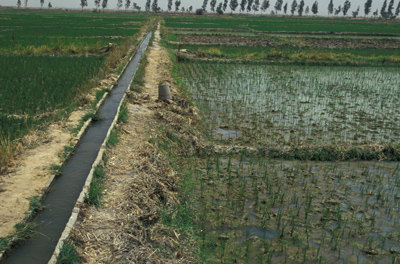Learning from Experience with Small-scale Irrigation in West Africa

Summary
Most West African farmers need to reduce their reliance on the region’s erratic rainfall patterns if they want to increase crop yields and diversify from traditional commodity production. A number of low-cost technologies for small-scale private irrigation, such as treadle pumps and manual well-drilling equipment, have been tested in West Africa, but financial, regulatory, and communications obstacles have limited their widespread use. The World Bank organized a South-South Facility-funded knowledge exchange for policymakers, agriculture experts, businesses, and representatives from NGOs across eight West African countries to promote awareness of irrigation technologies and to highlight policies that support small-scale, private irrigation projects and investments.
The field visits to each of the main exchange countries—Mali, Niger, Nigeria, Burkina Faso—along with a regional conference, highlighted the many lessons drawn from 20 years of trials with low-cost technologies for small-scale, private irrigation in different West African terrains. The exchange raised awareness of the variety of technologies available, as well as the financial, regulatory, and other obstacles to their implementation.
In post-exchange evaluations, 75 percent of conference attendees noted that the conference report was “relevant and likely to be used in the implementation of small-scale private irrigation,” signaling that the exchange would inform future policies and investments in simple irrigation technologies.
Beneficiaries / Participants
The World Bank and other development agencies are involved in a number of efforts to help West African farmers reduce their reliance on erratic rainfall patterns and to diversify from traditional commodity production into high-value agricultural products.
Many lessons have been drawn from twenty years of trials with low-cost technologies for small-scale, private irrigation in different West African terrains: soft soils have encouraged the use of water pressure-based systems for digging wells in Nigeria, for instance, while manual augurs in Niger and stone-hammer percussion systems in Mali and Burkina Faso operate in hard-soil environments.
However, financial, regulatory, and other obstacles have limited the widespread use of these technologies: farmers, retailers, distributors and others are not aware of all available technologies; many countries or regions lack agricultural extension services to teach their use; poor land-titling practices limit farmer access to collateral-based credit; and West African farmers lack access to international crop markets. Additionally, the human communication networks to disseminate knowledge about the technologies and policies to promote their implementation have, for the most part, been weak.
This exchange allowed a broad range of policymakers and stakeholders involved in implementing small-scale irrigation projects in West Africa to share their knowledge about the effectiveness and applicability of simple irrigation technologies, and about policies to support existing and future investment in such projects. Participants included irrigation experts, representatives from farmer organizations, financing institutions, research centers, agricultural nongovernmental organizations (NGOs), and private sector companies involved with irrigation technologies.
Moving forward
This exchange aligns with broader development programs to improve agricultural productivity in the targeted regions. These efforts include the European Union-funded All-ACP Agricultural Commodities Programme (AAACP) to help diversify agricultural production and increase rural incomes in African, Caribbean, and Pacific (ACP) countries. The exchange also furthers the objectives of the Agricultural Water for Africa (Agwa) program launched in 2008 by the African Development Bank (AfDB), the World Bank, the New Partnership for Africa’s Development, and other partners.
The potential for the exchange to contribute to long-term sustainability is also linked to the performance of the Regional Association for Irrigation and Drainage in West Africa (ARID), which promotes professional networking, scientific and technical exchanges, and training activities and workshops to build capacity.

 China
China Colombia
Colombia Denmark
Denmark India
India Indonesia
Indonesia Mexico
Mexico Russian Federation
Russian Federation Spain
Spain United Kingdom
United Kingdom